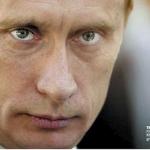I remember when Benedict gave a homily on our responsibility for creation a few years ago and the press reported that he wore special green vestments as a sign of his commitment to environmentalism.
That’s the calibre of informed theological awareness we are nearly always dealing with when the press reports on the Church. That, and the press’ love of narratives of conflict, is what drives nearly all reportage on this pope too.
So, f’rinstance, a few weeks back, Francis remarked on the immemorial Catholic teaching about the promise of a New Heaven and New Earth and the press managed to a) decide that Francis was saying something revolutionary in the history of Catholic teaching and b) read it as an attack on Mean Ol’ Benedict. Two birds with one stone! Let’s take a look in slo-mo at the car wreck of reportage (and bear in mind that this is but one out of a vast mosaic of similar mosaic pieces the media creates as it crafts the narrative of Francis vs. Mean Benedict and the Church):
It’s a dog’s afterlife: Pope Francis hints that animals go to heaven
The pontiff’s remarks were interpreted by some as bringing ‘hope of salvation … to animals and the whole of creation’
Okay, so now we’ve gone from the pope “hinting” to somebody else interpreting. Even less There there.
The endlessly controversial 77-year-old pontiff said: “The holy scripture teaches us that the fulfilment of this wonderful design also affects everything around us.”
Subtext, this revolutionary statement is “controversial”. Except that this is only true if you don’t know what the Church teaches. If you do, it’s entirely uncontroversial because Scripture does, in fact, say this.
The pope went on to quote from St Paul, St Peter and the Book of Revelation in support of the view that “what lies ahead … is therefore a new creation”.
Yes. A new heaven and a new earth are foretold in Revelation and St. Paul speaks of creation groaning in anticipation of the revelation of the children of God. Message: the power of Christ’s redemption doesn’t just affect us. It will renew all of Creation.
He added: “It is not an annihilation of the universe and all that surrounds us. Rather it brings everything to its fullness of being, truth and beauty.”
Again, yep. Grace does not destroy nature but perfects it.
Italian daily Corriere della Sera was in no doubt about his meaning. “It broadens the hope of salvation and eschatological beatitude to animals and the whole of creation,” wrote the paper’s Vatican specialist in an article published on Thursday.
It’s pretty loosey goosey to talk of animals being “saved” since animals are incapable of sin. Salvation is about salvation from *sin*. Non-rational creatures can’t be “saved” since they have no sin to be saved from. Similarly, “beatitude” in the theological sense ain’t happening since the ability to enjoy contemplation of God is no more in their nature than the ability to enjoy the works of Dostoeyevsky. That’s not an insult to non-rational creatures. It’s just reality.
That doesn’t mean that the rest of creation has no place in the scheme of redemption. The whole point of talking about a new heaven and a new earth is to say that it has. But talking about “animals going to heaven” in the sense of enjoying salvation as human shall is nonsense. Your dog is capable of enjoying a lot of stuff and may well be capable of enjoying a new earth. But he will never be capable of contemplating the face of God in the way that an angel or a redeemed human being will.
Others were not convinced.
“We all say that there will be a continuity between this world and the joyful one of the future, [but also] a transformation,” said Gianni Colzani, an emeritus professor of theology at the Pontifical Urbaniana University in Rome.
“It is the balance between the two things that we are not in a position to determine. For that reason, I think we shouldn’t make [Pope Francis] say more than he says.”
Exactly. Notice that the sane approach here is to *listen to the pope* and not to listen to what “some say” they speculate the pope means.
Though a noted cat-lover, Francis’s predecessor, Pope Benedict XVI, seemed to close the doors of heaven firmly to pets and other animals in a sermon he gave in 2008. “For other creatures, who are not called to eternity, death just means the end of existence on Earth,” he said.
And now we begin the Francis vs. Mean Benedict part of our show. Here is Benedict in context without the all-imported “seemed” to strengthen the narrative of conflict with what Francis likewise allegedly “seemed” to say:
Sooner or later everything that begins on earth comes to its end, like the meadow grass that springs up in the morning and by evening has wilted. In Baptism, however, the tiny human being receives a new life, the life of grace, which enables him or her to enter into a personal relationship with the Creator for ever, for the whole of eternity. Unfortunately, human beings are capable of extinguishing this new life with their sin, reducing themselves to being in a situation which Sacred Scripture describes as “second death”. Whereas for other creatures who are not called to eternity, death means solely the end of existence on earth, in us sin creates an abyss in which we risk being engulfed for ever unless the Father who is in Heaven stretches out his hand to us. This, dear brothers and sisters, is the mystery of Baptism: God desired to save us by going to the bottom of this abyss himself so that every person, even those who have fallen so low that they can no longer perceive Heaven, may find God’s hand to cling to and rise from the darkness to see once again the light for which he or she was made. We all feel, we all inwardly comprehend that our existence is a desire for life which invokes fullness and salvation. This fullness is given to us in Baptism.
What we notice here is that Benedict’s purpose is to contrast natural life (bios) with supernatural life (zoe). In particular, he is at pains to point out that the main death Jesus comes to rescue us from is the Second Death, not the first. Animals, being incapable of both communion with God and, therefore, of sin against him also are incapable of suffering the Second Death. They cannot destroy the communion that rational creatures like angels and humans can enjoy because they are not rational creatures. We can. And so the gift of baptism is given to us because we need it.
That’s not to say that I believe Benedict secretly believes animals will be in heaven. It’s simply to say that the purpose of the homily is not to establish any hard and fast doctrine about what critters (if any) will be in the new heaven and the new earth. It is, rather, to emphasize the reality that *we* are rational creatures who are playing for far higher stakes: eternal communion with God or eternal loss of God. Neither Francis nor Benedict are saying what is being put in their mouths and there is, at most legitimate diversity, not conflict happening here. And likely not even that. After all, Benedict knows about the New Heaven and New Earth too.
Certainly, the Catholic catechism holds out little hope for the animal kingdom in the next life – and not much for it in this life either. The keynote is the absolute primacy of mankind as the species which, according to Christian doctrine, was created in God’s image.
This is like saying the Catechism holds out little hope for Andromedans. The Catechism does not discuss the destiny of animals because the Bible is not the Big Book of Everything. We simply have no idea what God is up to with the rest of creation. Revelation is given in order to save our desperately depraved race. The divine answer to “What about my dog?” is “What is that to thee? Follow thou me.” We are given enough information to know things like “Don’t be cruel to animals” and “It’s okay to use them for food, clothing, and medicine”. We are not told anything about what God intends for them beyond that.
“Animals, like plants and inanimate beings, are by nature destined for the common good of past, present, and future humanity,” it says, while cautioning that “animals are God’s creatures”, and therefore “men owe them kindness”.
But it is clear in its view that it is “legitimate to use animals for food and clothing”. And it backs scientific experimentation on animals “if it remains within reasonable limits and contributes to caring for or saving human lives”.
Yep.
Pope Francis is known to be writing an encyclical that will deal with environmental issues. But it is unclear whether it will decide for once and all whether those who get to meet St Peter can expect to find a dog nearby lifting its leg on the pearly gates.
Actually, it’s perfectly clear: he won’t. The faith is not the Pope’s personal possession to which he can add new invented doctrines about things God has told us nothing about. God has not told much one way or t’other about the destiny of other creatures beyond “There will be a new heaven and a new earth”. Francis can’t discuss things God has not told us for sure. He can speculate a bit, but that’s about it.














